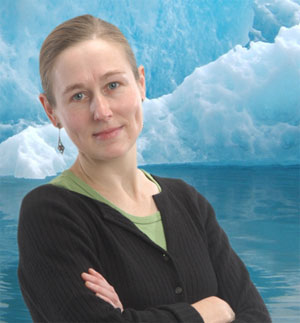 |
| Prof. Ruth Forsdyke has created the class, the Economics of Global Warming. (Photo illustration by Danny Abriel) |
Do you think transsexuals should be allowed to compete in elite sports in their elected gender? Should Siamese twins be separated if theyâre too young to give consent? Would you have a problem going to see Body Worlds, the anatomical exhibition which displays real human bodies that have been plasticized? If so, why?
These are some of the thorny questions Richard Wassersug expects to pose in the new class, . Presented in a lecture format, the class is cross-listed as a graduate-level course (ANAT 5555) in the Department of Anatomy & Neurobiology and as an undergraduate class (SOSA 4211) in the Department of Sociology & Social Anthropology. The class will also have a lab component, with anatomical demonstrations and some dissection.
âI donât believe thereâs another course like it anywhere in Canada,â says Dr. Wassersug, professor of anatomy and neurobiology in the Faculty of Medicine. Heâll share teaching duties with Eileen McKay, a pediatric pathologist at the IWK Health Centre. âItâs quite unique. Itâs both a course exploring the anatomy of the body and the body in society.
âSocial scientists and humanists donât have a chance to learn about the body and medical folk donât even have the time and patience to do qualitative research, to really probe those questions associated with the body, identity and what it means to be human.â
 |
| Fifteenth-century artist Benozzo Gozzoli depicts Augustine's conversion to Christianity. |
Other classes new to HÂş»âs course calendars include:
- (ECON 2216): One of the most stubborn arguments against doing something to reduce greenhouse gas emissions is that itâs just too expensive. To which Ruth Forsdyke, an environmental economist, responds itâs too expensive not to do anything. In this new second-year class, students will examine policies such as carbon taxes and âcap and trade,â and other options including strengthening technological standards and creating incentives to create green products and develop renewable energy sources. âItâs just such an important topic right now that the time was right for this class,â says Dr. Forsdyke, assistant professor in the Dept. of Economics. âWith Al Goreâs movie and the Nobel Prize, hopefully weâll see a broad attitudinal shift.â
- (LAWS 2210): Diana Ginn, associate professor with HÂş» Law School, will teach this upper-year seminar class which focuses on the relationship between law and religion in a secular, multi-faith society. Issues to be discussed include the use of religious reasoning in public discourse and law-making. Prof. Ginn has long been interested in the intersection of law and religion; her book, The Legal Guide for Canadian Churches (co-written with David Blaikie) has just been published by Novalis.
- (CLAS 4070/5070): This is a small class for upper-level undergrad and graduate students which delves into St. Augustineâs Confessions, one of the most influential and most innovative works of Latin literature. âAugustine appeals to students interested in philosophy, theology and literature,â says Michael Fournier, assistant professor in the Dept. of Classics. âHe was a teacher of rhetoric before becoming a bishop and he very consciously crafted this work in Latin.â Students will delve into scholarship on the text, make presentations to the class and are expected to complete a major paper.
- (SPAN 3095): This class offers a panoramic study of the evolution of spoken Latin into modern Spanish (no prior knowledge of Latin required). Topics covered will include: the major historical events that influenced the evolution of the language, including phonological, morphological, syntactic and semantic changes. The class, a lecture and discussion format conducted in Spanish, will be taught by Donna Rogers, professor and chair of the Dept. of Spanish.Â
- (ENVS 3301): In this new class offered through the Environmental Programs Dept., students will examine how the concept of sustainability can be incorporated into projects and focuses on the practical applications of pollution prevention techniques. Students can expect a hands-on course, with group work, student presentations, guest speakers, independent research and at least one field trip. The class has been created by instructor Janis Rod in response to issues raised by students in another class she teaches, Environmental Site Assessment (ENVS 3300). âStrictly speaking, pollution prevention is changing inputs or processes to minimize environmental impact,â she says. âThis is opposed to an âend of pipeâ treatment of wastes which is more common in industry.â
- : HÂş»âs College of Continuing Education is offering this new intense program, scheduled over 14 weekends and spanning 10 months. The certificate program will explore all aspects of business creation, including marketing, budgeting, human resources and legal issues. One-on-one counseling is also offered. The goal of the program is for entrepreneurs to create a solid business plan âthat you can take to the bank,â says Debbie Gordon, director of small business programs at the College of Continuing Education. She says the program will appeal to aspiring entrepreneurs, employees who have been downsized or who have taken early retirement and the hobbyist who wants to step into a new career.
LINK:
